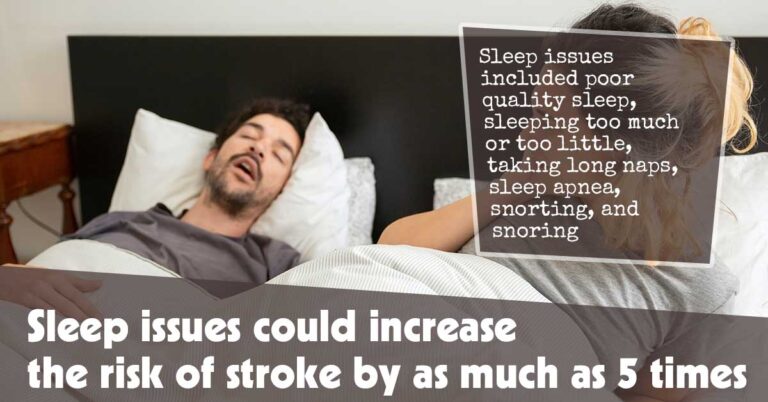Sleep Problems May Raise Stroke Risk by Up to 5 Times
Research has shown that individuals who have sleep problems are at a greater risk of stroke. Sleep problems include poor sleep quality, sleeping too much, or too little. They also include taking long naps and sleep apnea.
Individuals with 5 or more issues were at an even greater risk of stroke. The study shows only a correlation between sleeping problems and stroke. It does not prove that sleep problems cause stroke.
The results show that not only can sleep problems increase stroke risk, but having more than 5 symptoms of sleep issues can lead to a 5x greater stroke risk compared to those who do not have sleep issues. Sleep issues should be a focus in the prevention of stroke.
The study included 4,496 participants, including 2,243 stroke survivors compared with 2,253 stroke-free individuals. Participants averaged 62 years old.
The participants answered questions regarding their sleep habits, such as the quality of sleep, sleep duration and breathing problems while sleeping. They also included questions on napping, snorting and snoring.
Sleeping too much or too little increases the risk of stroke. 162 stroke victims slept less than five hours compared to 43 stroke-free individuals. 151 stroke victims slept more than 9 hours per night compared to 84 stroke-free individuals.
Individuals who slept less than five hours per night had a three-fold increased risk of stroke as compared with those who slept an average of seven hours. Over 9-hour sleepers had a 2x greater risk of stroke than those sleeping only 7 hours.
Napping for more than an hour increases the risk of stroke by 88% compared to those who don’t.
Snoring, sleep-apnea and snorting were all examined as breathing issues during sleep. Snorers had a 91% greater risk of stroke than those who did not snore, and snorters had almost a 3x higher stroke risk than those who didn’t snore. Sleep apnea patients had a 3x higher stroke risk than those who did not.
After accounting for factors such as alcohol, smoking, depression and physical activity, the results remained similar.
The study was limited by the fact that participants self-reported their sleep issues symptoms. This could have led to inaccurate information.
